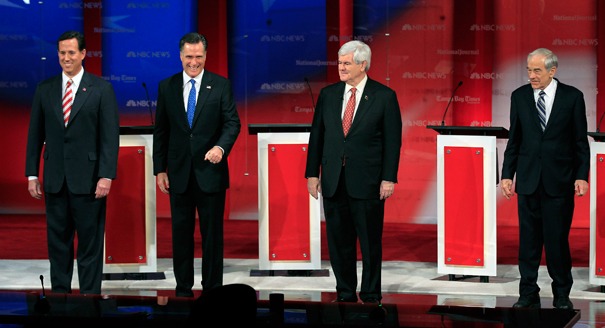It's been proven over and over: education gets the attention of voters. As the Republican primaries proceed, it's worth taking a good, hard look at the candidates' stances. This is one area where they have some real differences.
- First up, longtime watchers of education policy will remember Rick Santorum as the senator who proposed the Santorum Amendment back in 2001, an attempt to require the teaching of creationism in schools while questioning the validity of the theory of evolution. He still strongly supports this movement.
- Mitt Romney has laid out an education policy position that stresses standardized testing and school choice, although he has not taken a position on vouchers (a system where families would receive government funding that could be put toward their choice of private schools). On the issue of college affordability and funding, he is not a supporter of direct government support for education costs. Instead, according to one of his campaign managers, “He wants to empower families to save for their children's education by making money earned on savings interest, capital gains and dividends tax-free for all middle class taxpayers. In this way, middle class families could save more money for education or a home.”
- Candidates Newt Gingrich and Ron Paul have both come out against government-supported college loan programs. At one debate, Gingrich called it an “absurdity” and said it “expands the ability of students to stay in college longer because they don't see the cost.” Where Paul and Gingrich disagree, though, is on the issue of vouchers. Paul has called them “another tax-funded welfare program establishing an entitlement to a private school education.” Gingrich, meanwhile, is “a vocal supporter” of the School Choice Movement, with vouchers at the center of that policy position.
- Another issue dividing these candidates: whether the federal Education Department should exist at all. The general theme, when education has been raised in the debates, is that the federal government should leave education to the states; some of the candidates have gone so far as to promise to eliminate the department altogether (Ron Paul and former candidate Rick Perry foremost among them). Romney is the odd one out in this field, having never been especially vocal about keeping education at the state level – he is the only candidate who had kind words for Obama's “Race to the Top” education program, for which he has taken heat in debates.
- Finally, let's look at some of the more unique stands brought out by the Republican field. Newt Gingrich has come up with the plan that's drawn the most attention: he believes that schools should cut budgets and support children of low-income families by firing their janitors and hiring the kids. This comes as part of his push to roll back child labor regulations, which he believes are limiting the ability of low-income kids to better themselves. Meanwhile, Rick Santorum has been railing against Obama for what he sees as elitist attempts to get all kids to go to college, saying he was “outraged” by it. In a later campaign appearance, he said left-leaning “indoctrination” occurs at colleges and universities and therefore "It's no wonder President Obama wants every kid to go to college.” Most of the other candidates have stated the need for widespread higher education as a way to get America's economy back on track.
The education field could be an important one in this primary, as it seems to be one area where the candidates are willing to show their differences. For now, as primary season continues: enjoy the fireworks.
